A low-acid diet might seem constricting, but it doesn't have to be. You just have to familiarize yourself with the ph levels of your favorite foods and limit the ones that are highly acidic.

For example, if you enjoy drinking coffee with milk or eating cereal, you might wonder which type of milk is best to prevent acid reflux and GERD symptoms.
If you're drinking different kinds of milk, such as goat milk, you might want to know if it's safe for your digestive system. So, is goat milk acidic?
Table of Contents
Is goat milk acidic?
Goat milk doesn't have a very low pH level, but it's still acidic. That means that it's bad for acid reflux and GERD, and it also worsens already existing symptoms. On the bright side, goat milk contains lots of minerals and vitamins that help you stay healthy and may protect your digestive system from inflammation caused by acidic foods.
Because of that, if you can tolerate small amounts of goat milk every once in a while, it's a great addition to a healthy, balanced diet.
What is the pH level of goat milk?
The pH level of goat milk is around 6.40. While it leans towards neutral, the goat milk that's readily available in stores has acid-forming properties. This is because it has to be correctly preserved to spend a lot of time on the grocery store's shelves.
Because of that, it acidifies your digestive system and may lead to acid reflux and GERD symptoms. Different brands may have different pH levels, but generally, they remain within the same range, and all are acidic.
Fresh goat milk that hasn't been pasteurized has alkaline-forming properties, which means that it won't cause aid reflux symptoms if you consume it. It's relatively hard to get it, though, since it has to come straight from the goat.
What's more, if it's not consumed straightaway, it becomes spoiled and can cause indigestion, nausea, and diarrhea. Because of that, you either have to drink it instantly or pasteurize it, which makes it acid-forming.
Is goat milk good for you?

Goat milk provides you with many minerals and vitamins, but it's also high in calories. One cup of goat milk contains around 168 calories.
The majority of these comes from fat, and the rest comes from protein and carbohydrates. Because of the high-fat content, some people find that consuming too much goat milk leads to indigestion and an increase in the severity and frequency of acid reflux and GERD symptoms.
This is because fat forces your stomach to produce more gastric acid, which causes many unpleasant symptoms.
On the bright side, goat milk contains around 33% of your daily recommended need for calcium. This micronutrient is essential for building and maintaining strong bones. It also helps boost your immune system and prevent various infections.
Certain studies also suggest that calcium, along with vitamin D, may even help protect your body against cancer, diabetes, and high blood pressure. Another great way that calcium benefits your body is to assist in muscle contractions and prevent muscle weakness so it's important to consume enough of this mineral every day.
This type of milk also contains a good amount of riboflavin. Also called vitamin B2, this micronutrient is needed for the growth and proper health of your cells and tissues. It also plays a significant part in how your body metabolizes and uses carbs, fats, and proteins.
Riboflavin turns these macronutrients into energy and stores them in cells for later use, which helps in avoiding muscle weakness and lethargy.
This vitamin is mostly present in dairy products, including milk, eggs, yogurt, and cheese, and it's essential to keep your body functioning properly.
Goat milk is also a wonderful source of phosphorus. This essential mineral aids in muscle recovery helps flush out toxins out of your kidneys and promotes healthy nerve conduction.
Milk and other dairy products contain good amounts of phosphorus, so it's important to include these products in your diet to ensure that you're getting enough of this mineral.
In addition to all of these benefits, phosphorus contains compounds that help your body absorb nutrients, so you're even more likely to take in enough minerals and vitamins.
Research also suggests that drinking goat milk may help your body absorb nutrients and vitamins more easily. This can help prevent vitamin deficiencies as well as help you stay healthy. In addition, since goat milk is already rich in micronutrients, it helps you stock up on all of the wonderful health benefits they provide.
What's more, the substances in goat milk that help you absorb more nutrients also protect your stomach lining from inflammation, which can be helpful for people with acid reflux.
Is goat milk bad for acid reflux?
Goat milk, just like most types of milk, is acid-forming. This means that it has a tendency to acidify your stomach and cause acid reflux and GERD symptoms. It's also slightly higher in fat than other kinds of milk, which means that it spends more time in your stomach before it's digested.
There's also more stomach acid needed to break down fat, so your acid reflux symptoms might become even worse.
In spite of all that, most people don't consume too much goat milk in one sitting. Because of that, it's very unlikely to severely worsen your digestive symptoms.
It's also an excellent source of minerals and vitamins that help you stay healthy and might offset the negative effects of goat milk's acidity.
Just like other dairy products, goat milk is acid-forming, so it may worsen your acid reflux and GERD symptoms. It's also high in fat, which slows down digestion and leads to stomach acid rising up your esophagus and causing heartburn.
On the other hand, goat milk contains many essential vitamins and nutrients, so it can help you stock up on these healthy nutrients. So, even though it's not commonly consumed around the world, it might be a great addition to any diet, even if you'd consume it rarely.
Don't know what to drink? Check out these articles: 20 Most and Least Acidic Juices and 20+ Alcoholic Drinks Ranked by Acidity Level
